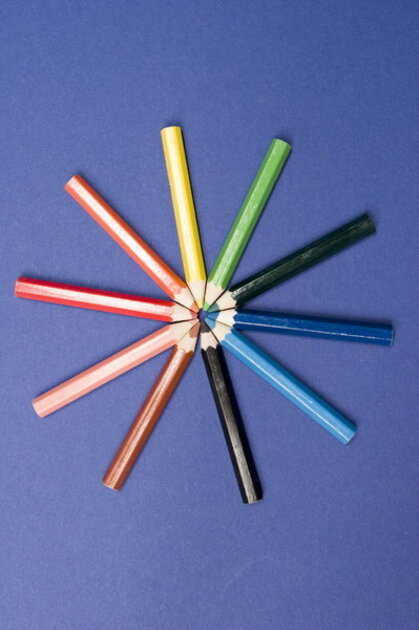
The Gemara discusses the principle of כבולעו כך פולטו which means that in order to remove non-kosher food essences that become absorbed inside utensils, one must subject them to the same conditions under which they were absorbed. For example if a utensil absorbed food essence in boiling water then it needs to be koshered in boiling water. Or, if a utensil absorbed food essence by exposure to direct flame, it needs to be koshered in that same manner.
The Likkutei Halachos (יו״ד הלכות הכשר כלים א:ג), which is a Chassidic/Kabbalistic commentary on Shulkhan Arukh, sees a mystical meaning in this principle. That is, different levels of impurity penetrate the soul in different ways. The more severe the sin, the more severe measures one must take to expunge the impurity from their soul. Also, just as different materials are more or less subject to being purified, so two with different states of mind. So, for example, metal vessels absorb impurity but also through exposure to similar means, i.e., boiling water or flame, they could expunge their impurities. However, earthenware vessels absorb but don’t spit out. So too, unfortunately there are some individuals whose attitudes leave them more vulnerable to absorbing impurities but have a harder time purging them. (This last part is subject to interpretation, so check the original version out as printed below.)
I also would like to offer a psychological interpretation to this principle, based on one of my favorite teachings of Carl Jung: Jung says the degree to which you will influence somebody is directly proportional to how willing you are to be influenced. Meaning, if you engage in a relationship with somebody and you are convinced your way is the right way, you are unlikely to succeed in influencing that person any more than you are willing. Which is to say, not much at all. However if you engage in the relationship ready to be influenced, to that degree the person will sense your openness and become open to you as well.
ליקוטי הלכות יו״ד הלכות הכשר כלים א:ג
וְעַל-כֵּן עִקַּר קַבָּלַת טֻמְאָה בִּכְלֵי מַתָּכוֹת בְּיוֹתֵר מִכָּל הַכֵּלִים, כִּי אֲפִלּוּ פְּשׁוּטֵיהֶן טְמֵאִים וְגַם חוֹזְרִין לְטֻמְאָתָן הַיְשֵׁנָה, עַיֵּן בְּמַסֶּכֶת כֵּלִים, כִּי שָׁם עִקַּר אֲחִיזַת הַטֻּמְאָה, כִּי נֶאֱחָזִין בְּיוֹתֵר בִּכְלֵי מַתָּכוֹת כַּנַּ"ל. וּכְנֶגֶד זֶה יֵשׁ מַעֲלָה גַּם כֵּן בִּכְלֵי מַתָּכוֹת שֶׁאֲפִלּוּ אִם נִבְלָע הָאִסּוּר בְּתוֹכָם יֵשׁ לָהֶם תִּקּוּן בְּהַגְעָלָה וְלִבּוּן, כָּל כְּלִי כְּפִי מַה שֶּׁנִּשְׁתַּמֵּשׁ בּוֹ הָאִסּוּר, כִּי כְּבוֹלְעוֹ כָּךְ פּוֹלְטוֹ, כִּי כָּל אֶחָד כְּפִי מַה שֶּׁפָּגַם כֵּן יְתַקֵּן בִּבְחִינַת תְּשׁוּבַת הַמִּשְׁקָל כַּמּוּבָא לְעֵיל, אֲבָל כְּלֵי חֶרֶס אֵין לָהֶם שׁוּם תִּקּוּן כְּשֶׁנִּבְלָע הָאִסּוּר בְּתוֹכָם, כִּי כְּבָר מְבֹאָר כַּמָּה פְּעָמִים שֶׁעִקַּר אֲחִיזָתָם בְּמָקוֹם שֶׁיֵּשׁ קְדֻשָּׁה בְּיוֹתֵר שֶׁשָּׁם הֵם כְּרוּכִים תָּמִיד. וְעַל-כֵּן עִקַּר הַטְּבִילָה בִּכְלֵי מַתָּכוֹת שֶׁשָּׁם בְּחִינַת הַפָּנִים כַּנַּ"ל, אֲבָל כְּלֵי חֶרֶס שֶׁאֵין שָׁם פָּנִים דִּקְדֻשָּׁה וְהֵם הֵפֶךְ הַמָּמוֹן, כַּמּוּבָן מִדִּבְרֵי רַבֵּנוּ בְּמָקוֹם אַחֵר (בְּסִימָן סט), שֶׁפֵּרֵשׁ 'וְעַפְרֹת זָהָב', שֶׁהוּא בְּחִינַת הַמָּמוֹן שֶׁיָּצָא מִשָּׁם הַחַיּוּת דִּקְדֻשָּׁה שֶׁאֲזַי נִשְׁאָר עַפְרָא בְּעָלְמָא. נִמְצָא, שֶׁעַפְרָא בְּעָלְמָא הוּא הֵפֶךְ הַמָּמוֹן שֶׁיֵּשׁ בּוֹ חַיּוּת דִּקְדֻשָּׁה. וְעַל-כֵּן כֵּלִים שֶׁל עָפָר, דְּהַיְנוּ כְּלֵי חֶרֶס אֵין צְרִיכִין טְבִילָה כְּשֶׁיּוֹצְאִין רַק מֵרְשׁוּתוֹ שֶׁל עַכּוּ"ם, כִּי אֵין הַסִּטְרָא אָחֳרָא כְּרוּכָה שָׁם לִנֹּק מִשָּׁם כַּנַּ"ל, אֲבָל כְּשֶׁכְּבָר נֶאֱחָז בָּהֶם הַסִּטְרָא אָחֳרָא, דְּהַיְנוּ כְּשֶׁנִּבְלָע הָאִסּוּר בְּתוֹכָן, אֲזַי אֵין לָהֶם שׁוּם תִּקּוּן, כִּי הַתּוֹרָה הֵעִידָה עַל כְּלֵי חֶרֶס שֶׁאֵין הָאִסּוּר יוֹצֵא מִשָּׁם, כִּי מֵחֲמַת שֶׁחַיּוּתָם מֻעָט וְקָטָן מְאֹד כַּנַּ"ל, וּמֵחֲמַת זֶה הֵם קַלִּים לְהִשָּׁבֵר. עַל-כֵּן כְּשֶׁנֶּאֱחָז בָּהֶם הַסִּטְרָא אָחֳרָא, דְּהַיְנוּ שֶׁנִּבְלָע בָּהֶן הָאִסּוּר, אֲזַי הֵם נִפְגָּמִים לְגַמְרֵי וְאֵין לָהֶם תִּקּוּן, אֲבָל כְּלֵי מַתָּכוֹת הֵם בַּהֵפֶךְ מַמָּשׁ שֶׁצְּרִיכִין טְבִילָה מֵחֲמַת שֶׁכְּרוּכִין שָׁם מְאֹד כַּנַּ"ל. אֲבָל אַף-עַל-פִּי-כֵן יֵשׁ לָהֶם טָהֳרָה בַּמִּקְוֶה, אֲפִלּוּ אִם נִטְמְאוּ מַמָּשׁ, וַאֲפִלּוּ אִם נִבְלָע הָאִסּוּר בְּתוֹכָן, אַף-עַל-פִּי-כֵן יֵשׁ לָהֶם תִּקּוּן בְּהַגְעָלָה וְלִבּוּן, כִּי מֵחֲמַת שֶׁיֵּשׁ בָּהֶם חַיּוּת גָּדוֹל מֵהַקְּדֻשָּׁה וּמֵחֲמַת זֶה כֹּחָם חָזָק בְּיוֹתֵר מִכָּל הַכֵּלִים וְעַל-כֵּן אֵין נִפְגָּמִין לְגַמְרֵי לְעוֹלָם, וּלְעוֹלָם יֵשׁ לָהֶם תִּקּוּן. וְכַמּוּבָא לְעֵיל (בְּהִלְכוֹת חֵלֶב, הֲלָכָה א); שֶׁבְּמָקוֹם שֶׁיֵּשׁ קְדֻשָּׁה יְתֵרָה, אַף שֶׁשָּׁם נֶאֱחָזִין בְּיוֹתֵר, אַף-עַל-פִּי-כֵן אֵינוֹ נִפְגָּם לְגַמְרֵי, חַס וְשָׁלוֹם, וּלְעוֹלָם יֵשׁ לוֹ תִּקּוּן לְגֹדֶל הַקְּדֻשָּׁה שֶׁיֵּשׁ שָׁם. וְגַם כִּי כֹּחָם חָזָק מְאֹד לִסְבֹּל הַתִּקּוּן, כִּי אֲפִלּוּ אִם צְרִיכִין לִבּוּן, יְכוֹלִים לְלַבְּנָם בָּאוֹר. וַעֲדַיִן יִשָּׁאֲרוּ כֵּלִים כְּמוֹת שֶׁהָיוּ, אֲבָל כְּלֵי חֶרֶס אֵין לָהֶם תִּקּוּן כַּנַּ"ל, וְגַם אֵין לָהֶם כֹּחַ לִסְבֹּל הַתִּקּוּן, אֲבָל כְּלֵי מַתָּכוֹת יְכוֹלִים לְצָרְפָם וּלְלַבְּנָם וּלְתַקְּנָם, וְעַיֵּן בְּכִתְבֵי הָאֲרִ"י, זִכְרוֹנוֹ לִבְרָכָה מְבֹאָר זֹאת הֵיטֵב; שֶׁהַנְּשָׁמוֹת הַגְּבוֹהִים סוֹף כָּל סוֹף יִתְתַּקְּנוּ כָּל הַנִּיצוֹצוֹת שֶׁלָּהֶם אֲפִלּוּ אִם נָפְלוּ מְאֹד מְאֹד לְמָקוֹם שֶׁנָּפְלוּ אַף-עַל-פִּי-כֵן לֹא יִהְיֶה נֶאֱבָד שׁוּם נִיצוֹץ מֵהֶם, עַיֵּן שָׁם:
Translations Courtesy of Sefaria, except when, sometimes, I disagree with the translation ![]()
Do you like what you see? Please subscribe and also forward any articles you enjoy to your friends, (enemies too, why not?)
 Previous
Previous

